There's a lot of debate about credit cards and their role in financial freedom. For most people, credit cards are a convenient way of making purchases and often serve as a quick source of funds during an emergency. On the other hand, a lot of people end up with a mountain of debt when they use credit cards irresponsibly. But neither view shows the full story. In the right hands, a credit card can be a powerful financial tool.
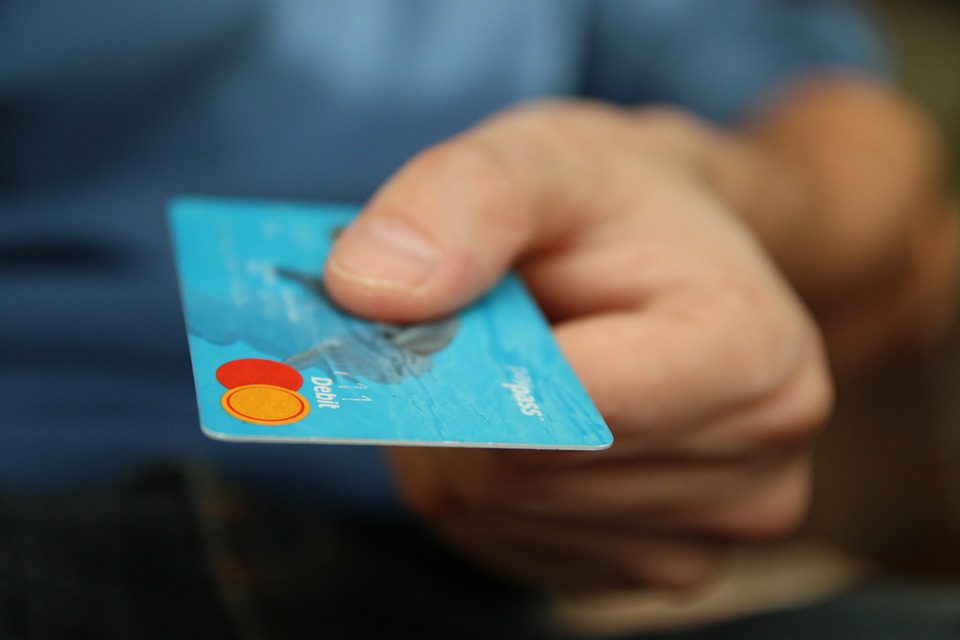
There are many advantages of credit card use, such as having an excellent credit history and receiving cashbacks. However, choosing the right credit card can be quite a challenge since it has a long-term impact on your finances. There are many factors to consider when selecting a credit card.
Our Ultimate Credit Card Guide is here to give you everything you need to know about credit cards so that you can use them in the best way possible.
Heads up: This guide is quite long, so we provided anchor links to help you jump to sections that interest you. You can also choose to read this article chronologically.
- Credit Card Basics
- Popular Credit Card Companies
- Pros and Cons of Using Credit Cards
- Credit Cards vs Debit Cards
- Secured vs Unsecured Credit Cards
- Types of Credit Cards
- Choosing the Right Credit Card for You
- Applying for a Credit Card
- Interest Rates and the Grace Period
- Minimum Payments and Your Credit Score
- Credit Card Fees
- Recommended Credit Cards
- Credit Card Safety
- Frequently Asked Questions
- Conclusion
Let's dive in!
Credit Card Basics
Credit cards are quite popular because they are more convenient and safer than carrying cash. A good mindset for using credit cards is to think of that piece of plastic as borrowed money — it's certainly not magic money that grows on trees! When you charge purchases or pay for services with a credit card, the amount should be repaid within an agreed period to avoid interest rates.
Getting a credit card depends on your ability to repay the money you borrowed. Understandably, the companies that issue these cards are cautious about giving credit. These lenders look into a borrower's spending habits and then determine the risks based on the borrower’s credit report. The credit report basically shows your credit history combined with financial information such as repayment history, the limits of your account and your credit accounts.
The lenders review your credit score using a numerical rating that they apply to your credit history. One of the most common methods is the FICO score. The FICO score (Fair Isaac Corporation) takes into consideration these factors to determine your credit score: your credit history, your present level of debt, any new credit and your payment history.

A credit card is a thin, rectangular piece of plastic that has a series of numbers that represent your account information. You can also see the following on a typical credit card: your name, an expiration date, the logo of the issuer, your signature, and a magnetic tape at the back.
What actually happens when you make a purchase is that the sales device reads the information from this magnetic strip. Then, if everything is in order, the store reader sends an electronic message to the bank to ask for authorization. The bank then responds to the merchant with an approval or denial code, based on your account information.
Popular Credit Card Companies
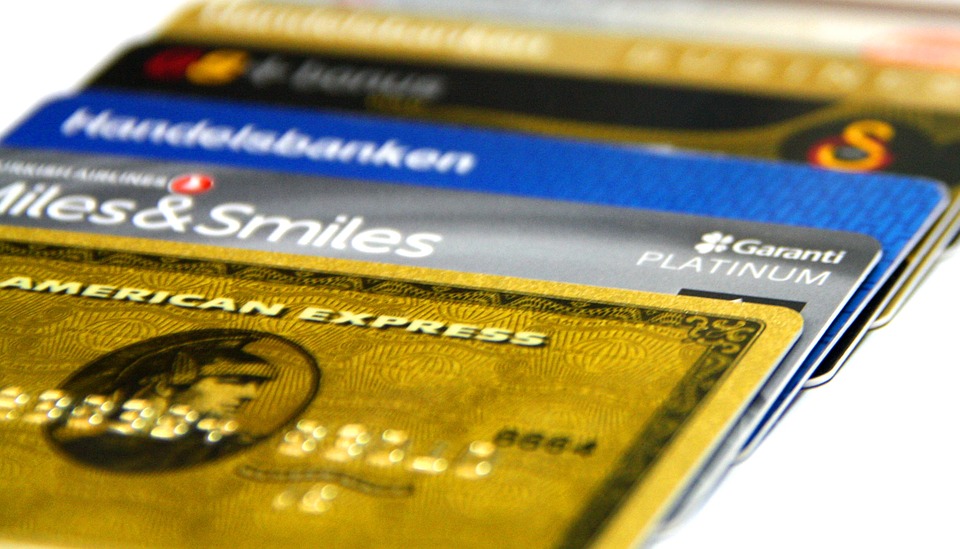
American Express
American Express was established in New York City in 1850 and now operates in over 130 countries around the world. This company targets consumers with high income and strong credit scores. In recent years, American Express has partnered with Walmart, making this the company’s first attempt to expand its target market.
Bank of America
Bank of America is one of the largest financial institutions in the world. Founded in 1904 in San Francisco, its headquarters are currently in Charlotte, North Carolina. In addition to issuing credit cards, Bank of America also offers deposit accounts and financial management services.
Capital One
Capital One is currently the fifth largest credit card company in the US and was established in 1955. The company made its reputation by providing simple programs and consumer structures. Also, Capital One was one of the first companies that abolished foreign transaction fees on their credit cards.
JPMorgan Chase & Co.
Established in 1799, this company is one of the Big Four Banks of the US. Considered “too big to fail,” JPMorgan Chase is also the world's sixth largest bank, thanks to millions of satisfied customers. This company is known for the variety of its credit cards, making it one of the best credit card issuers.
Citibank
The Citibank was formed in New York in 1812 and is one of the most influential banks in the world. It is known for its early adoption of banking technology and its worldwide market. Aside from credit cards, Citibank also offers investment instruments and insurance coverage.
Wells Fargo
Wells Fargo is a banking and financial services company founded in 1852 in California. It is the world's largest bank based on market capitalization. In 2015, Wells Fargo was ranked in third place in overall assets in the US Well Fargo was also named as the most respected bank by Barron’s magazine. This company offers a vast range of credit cards with the best protection available.
Discover
Discover was first to come up with innovations based on consumers preferences, like pioneering cash rewards and card offers with no annual fee. Today, Discover is one of the leading brands in electronic payment services and one of the most recognized companies in the US financial services.
Pros and Cons of Using Credit Cards
Credit cards can be very useful, but there are also downsides to using them. Here is a list of the benefits and disadvantages of using plastic.
Pros
- Credit cards are very convenient to use. Searching for an ATM machine to withdraw cash can be very time-consuming. Since you won’t need to carry cash around, they are also much safer.
- They can help you keep track of your expenses. Credit cards provide end summaries that can really help you when you do taxes.
- They have low-cost loans and cash advances that can be useful in an emergency.
- They have numerous money-saving perks, from discounts on certain types of goods to cashbacks. Credit companies offer various programs depending on your purchasing power and needs.
- Used responsibly, you can build up a positive credit score that will let you borrow larger funds in the future, such as a mortgage. You'll need to pay your bills on time and stay within your purchasing limit.
- You can move to lower-rate cards. Credit companies mostly offer low introductory interest rates that can allow you to move your balances to lower-rate cards.
- They have purchase protection. When you purchase a product, and it turns out to be defective, the credit card companies will take care of disputes for you if the merchant won't take it back. Contact your credit card company if such an event occurs.
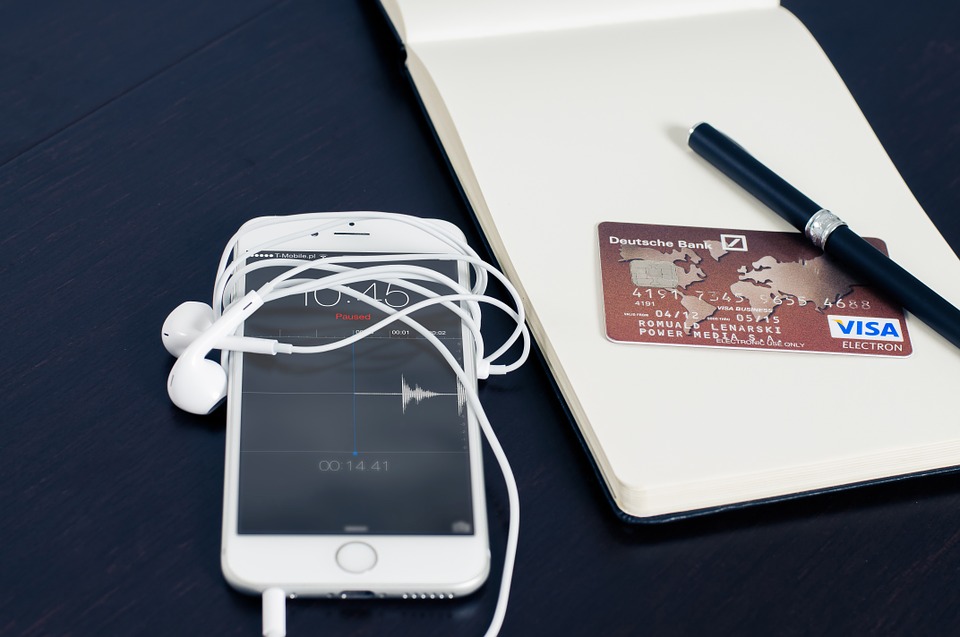
Cons
- It's quite tempting to use a credit card to go on a shopping spree and buy things you normally can't afford. However, that can quickly lead to debt if you can't pay the monthly payments. Remember, credit card companies charge interest on top of the actual amount you spent.
- You will have additional paperwork. Save your receipts and compare them with your statement to check if you have been overcharged. Make sure you keep track of your spending.
- You may have some unexpected fees for cash advances which are normally between 2 and 4 percent. Also, cash advances have high-interest rates.
- Low introductory rates may hook you up, but they last only for a defined amount of time. Make sure you pay attention to this one as the interest rates can jump quite dramatically.
Credit Cards vs Debit Cards
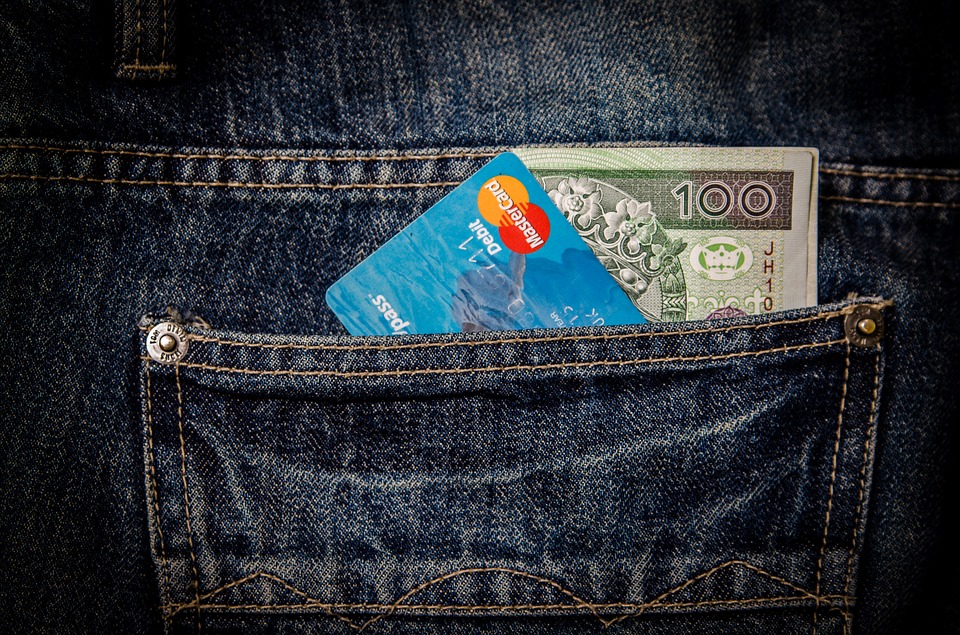
Credit cards and debit cards are accepted at the same places and look almost the same. But there is one key difference between these two: where the money comes from when you buy something.
Debit cards can be used to pay for items or withdraw money from ATM machines. The money you spend with a debit card is taken from your personal account. If you don't have enough money in your personal account, you can't make a purchase. Once a purchase is made using a debit card, it is often very difficult to cancel the transaction.
Credit cards work in a different way. Instead of being directly linked to your account, credit cards use borrowed money. When you buy something with a credit card, the money is added to your balance. You need to pay the balance within 30 days (depending on the issuer) if you want to avoid interest or late penalty fees. Interest rates are extremely high, so it would be wise to pay before the deadline.
Secured vs Unsecured Credit Cards
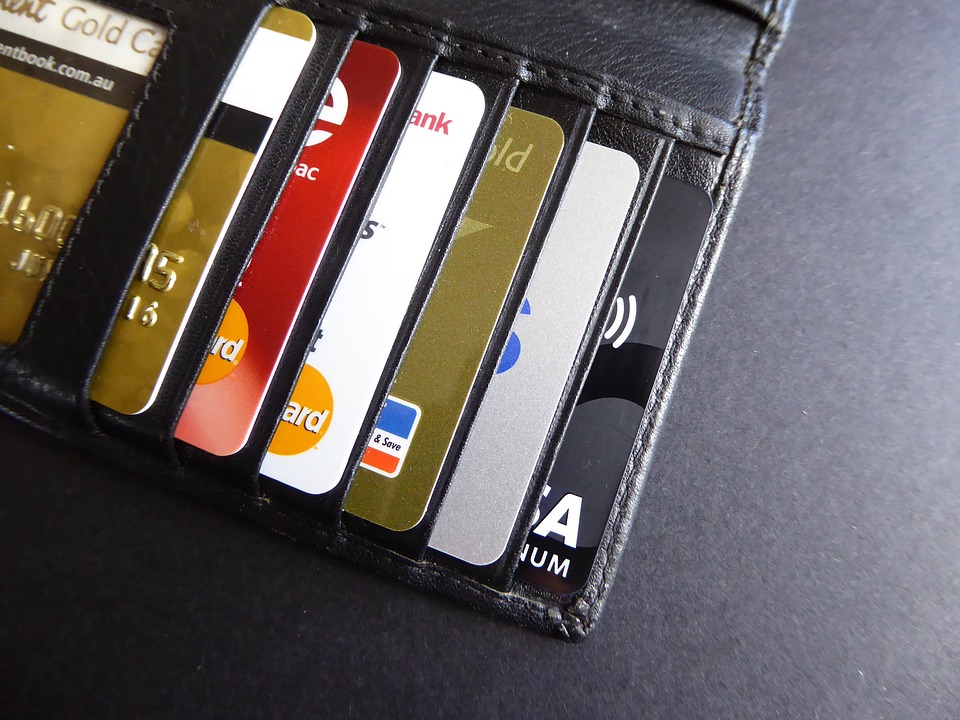
Secured cards require a cash deposit that is usually equal to the credit limit. For example, if the credit limit of your card is $300, you would need to deposit $300 as collateral. This protects a card issuer from the risks of nonpayment. Secured credit cards are issued to users who have bad credit or no credit history at all. They are a great way to start building up your credit history.
Unsecured cards don't have any mandatory deposits and are not backed up by any collateral. Secured cards can transition to unsecured cards if you have a good credit history and have paid off your balance in full. For this card, the credit limit is based on your credit history and your declared income. Retail, rewards, and low-interest cards are mostly unsecured. They offer various benefits like cashbacks, store discounts, and travel perks.
Types of Credit Cards
There are numerous types of credit cards you can choose from, since companies have added features to suit specific needs. Listed here are the most common credit cards on the market today.
Standard Credit Cards

Standard credit cards are the most common type and do not require a security deposit. They are available in a lot of banks and come in two basic kinds.
- Balance transfer credit card
This credit card allows you to move a high-interest credit card balance into another one with a lower interest rate. Popular balance transfer cards offer an introductory annual percentage rate of zero percent.
- Low-interest credit card
Consumers can choose between two kinds of low-interest credit cards. The first kind has a low introductory APR that can increase after a specified period, while the other type has a single, low fixed-rate APR. If you want to make a big purchase, this card allows you to pay it off with very low or no interest at all.
Reward Programs Credit Cards
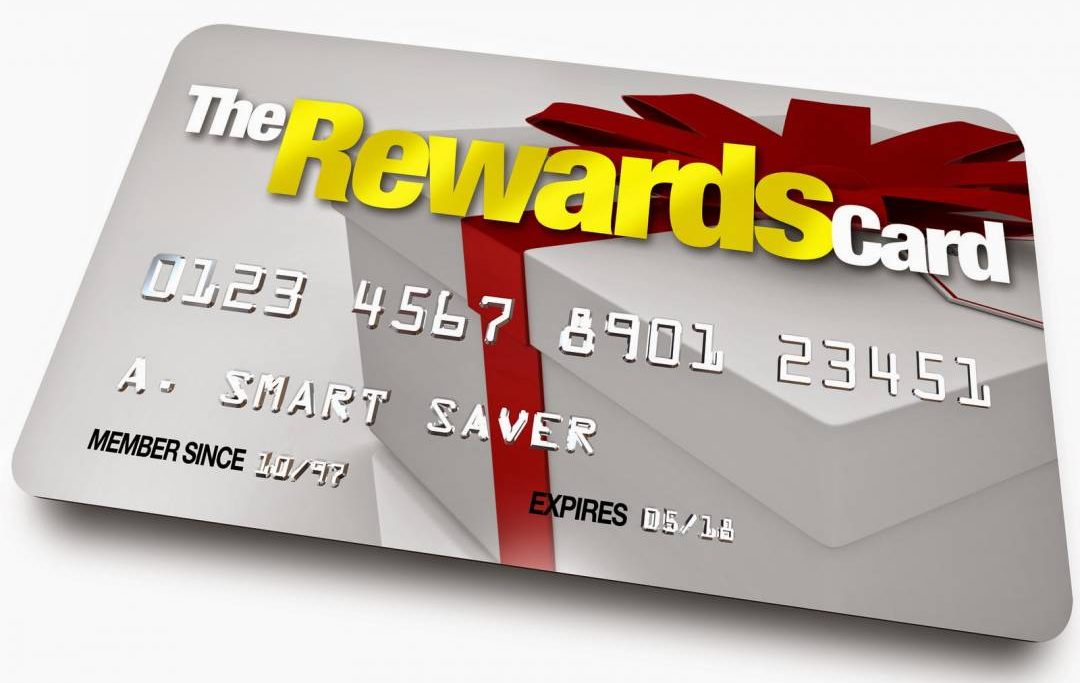
This credit card awards points for each dollar you spend. After you have accumulated a certain number of points, you can claim different rewards.
- Cash back credit cards
This kind of credit card is made for people who love to pay off their balance each month, since it gives you a cashback incentive. If you use this credit card often and follow the rules, you can save a decent amount of money.
- General reward points credit cards
General reward cards let you exchange points for gift cards, plane tickets, jewelry, and others. These reward programs and promotions tend to change, so it’s advisable to read all the conditions carefully before applying. Some of these cards come with an annual fee.
- Travel points credit cards
This is a reward credit card made specifically for travelers. Points are earned for money spent on airfare, hotel accommodations and other related expenses. These points can then be used to purchase plane tickets or book hotel stays. If used often enough, you can travel for free.
- Retail rewards credit cards
Retail credit cards are co-branded with big retailers like Amazon.com, and points are earned with every purchase. You can exchange these points for services or products from the partner store.
- Gas cards with points or rebates
There are two kinds of gas cards: general and brand-specific. Brand specific gas card can make you save and earn some amount of money if you are loyal to a certain company. If you are not particular about which gas station you visit, then the general card is definitely for you.
Frequent Flyer Credit Cards

This card allows users to earn airline miles by making purchases. Similar to the gas reward cards, some airline cards are also co-branded.
- Airline-specific credit cards
A cardholder collects points by flying on one particular airline or making a purchase with the card. You can also earn specific or double points if you purchase tickets, and you can avoid baggage fees and similar charges.
- Generic airline miles cards
You can redeem reward points if you use this card when booking a flight with any airline company, travel agent or online travel site. It is an excellent choice for people who travel often but are not loyal to a particular brand.
Bad Credit and Credit Repair Cards
There are several credit cards designed to repair your credit history. Even users with a poor credit score or bad credit can still qualify for these credit cards.
- Secured credit cards
A secured credit card is meant for people who are trying to rebuild their credit history or for individuals with no credit history. A collateral or security deposit is always required when applying for this card. This deposit needs to be equal or bigger than the credit amount. Collateral can be a car, stocks, jewelry, a boat or anything worth a certain amount of money. They often come with small credit lines, but if used responsibly, you can ask for an increase in your credit line.
- Prepaid credit cards
The biggest advantage of prepaid credit cards is that all purchases are paid for in advance, thus helping you avoid debt. There are no finance charges and you can determine what your credit line is. You don’t have monthly fees, but startup or application fees, ATM fees, or reload fees may be charged by the bank.
Specialty Credit Cards
These cards are for users that have special needs, such as businesses and students.
- Student credit cards

Image source: blog.credit.com
Many students have little or no credit history, so it is pretty hard for them to apply for a traditional credit card. Banks saw the gap and offered credit cards that help students build a whole credit history while still in college. If used responsibly, these cards can qualify for higher credit lines.
- Business credit cards
These cards are meant for executives or business owners, and include traditional credit card features. The main difference is that these cards help separate business expenses from personal ones. These cards often include specific business rewards and financial reports. A business owner can also get a special additional card for an employee.
Choosing the Right Credit Card for You
How do you choose the credit card that best suits your needs? It is important to find out the advantages and disadvantages of different cards before making a commitment. Here are some features you should consider while looking for the best one.
Cash Back
Are you disciplined when it comes to paying your bills? A cash back credit card is perfect for responsible users who can pay the full balance every month. The more you purchase with this card, the bigger your reward points will be. You can get up to 5% cash bonus using this card, so this is a great choice for big spenders.
Low Interest
Do you need to buy something really expensive but don't have the cash on hand? Low-interest cards offer a low annual percentage rate (APR) that usually applies to a fixed period. So if you are looking to make a big purchase or save money on monthly payments, this card is perfect for you.
Travel Perks
Do you often travel on business or regularly spend vacations far from home? If the answer is yes to either, choose a card that rewards you every time you travel. Your points can be redeemed for airline miles, hotel accommodations and more.
Balance Transfer
Are you trying to get out of debt? Get some breathing room by transferring a high-interest credit balance to a card with a lower interest rate. Many of these cards offer 0% balance transfer rate for a specified period.
Applying for a Credit Card
It's crucial to thoroughly read all the terms and conditions before signing up for a credit card. This way, you can maximize the use of your card and avail of any rewards. You can also avoid unnecessary fees and ask for help in case there are questionable charges in your statement.
Keep in mind that credit issuers will have access to your entire credit history, so it is advisable to pay your bills on time. If you don’t, you will be charged a penalty or late fee, and the incident will be added to your credit report. Also, don’t apply for a lot of credit cards. While having more than one can improve your credit score, the more cards you have, the bigger the risk of spending more than you can afford.
Interest Rates and the Grace Period
Calculating Interest Rates
Your credit card limit is determined by the card balance, an amount you accepted when you were applying for the card. However, if the entire balance isn't paid off, you will accumulate interest every day during the month. The periodic interest rate is calculated by dividing your APR by 365 days. Multiply your daily balance by the periodic interest rate and all the days in a month; that is your interest for one month.
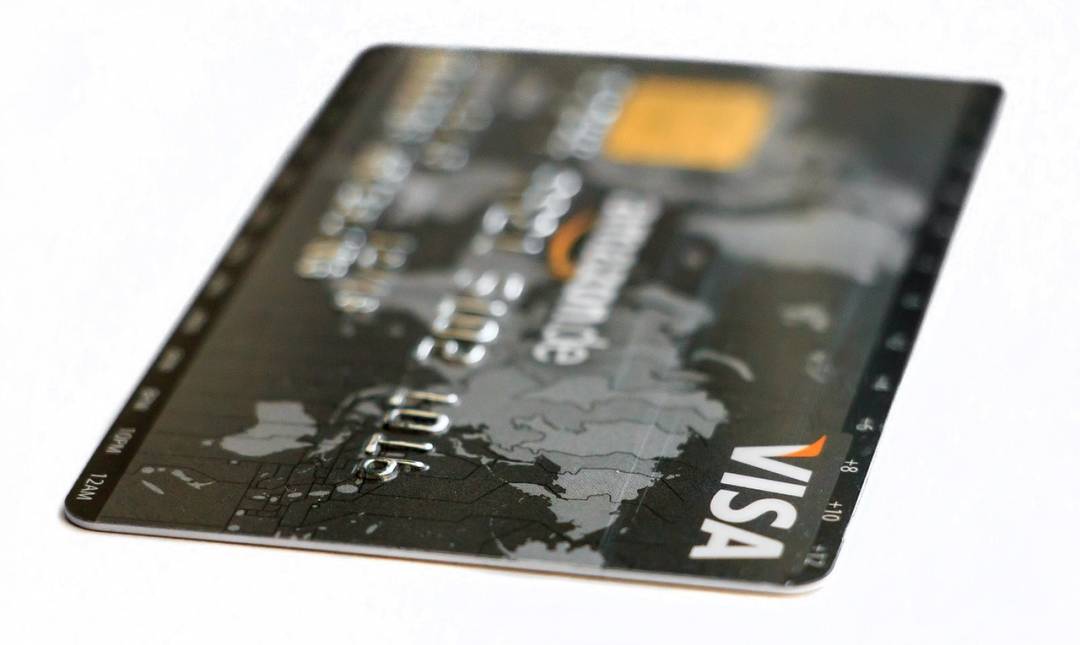 Credit card companies often set a minimum payment in case you are unable to pay off the entire balance at the end of the month. Keep in mind that if you take money in advance, you will have to pay a higher interest rate and there is no grace period. There is also a penalty interest rate if you are late with your payment or if you go beyond your credit limit.
Credit card companies often set a minimum payment in case you are unable to pay off the entire balance at the end of the month. Keep in mind that if you take money in advance, you will have to pay a higher interest rate and there is no grace period. There is also a penalty interest rate if you are late with your payment or if you go beyond your credit limit.
Grace Period
Most credit card companies offer a grace period of 21 to 25 days. This grace period means that any purchase you made in the given period will be interest-free until the payment due date. This payment due date must remain the same every month. You can use the grace period to avoid paying interest altogether.
Minimum Payments and Your Credit Score
Minimum Payments
A minimum payment is the lowest amount you can pay every month without harming your credit history. There are several methods to calculate these payments but the most important two are:
Percentage + interest + fees method: The issuer can take a percentage of your debt, plus interest and fees. The issuer charges you a minimum payment on your balance plus your interest accrued and your payment fee.
Percentage method: Minimum payment can also be calculated based on a percentage of your balance. This is usually ranges from 1% to 3%.

Credit Cards and Your Credit Score
The FICO score, the most popular model among lenders, is determined by five factors: payment history (35%), credit utilization (30%), the length of credit history (15%), types of accounts in use (10%) and new credit (10%).
Paying your credit card on time has a positive effect on your credit score and payment history. When you pay late or don’t pay at all, it will definitely hurt your final credit score.
Credit utilization is the percentage of your credit line. That means that you need to keep your debt balance below 30% of your credit limit.
The length of your credit history is the distance from your newest to you oldest accounts. The way to improve your score here is to keep former accounts active.
Types of accounts in use are the various credits you have currently, such as auto loans, mortgages and others. This factor has a minimal effect on your FICO.
If you apply for a new credit card, your score can be a little bit damaged. To maintain your FICO score, avoid applying for several cards within a short period.
Credit Card Fees
Not all credit card fees are necessary. In fact, you can avoid several fees altogether by reading the fine print in your credit card contract. Let’s check out the most common fees:
Balance transfer fee: This fee is charged when you move the balance from one card to another one, and ranges from 3% to 4%. There are credit cards without a balance transfer fee, but you need to qualify to apply for these.
Annual fee: This is the most common fee and applies to both secured and unsecured credit cards. You can decrease your payment by simply getting a card without an annual fee.
Late payment fee: If you are unable to deposit the minimum payment on the due date, it will typically cost you an additional $35. If you want to avoid this penalty, make sure that your payments are on time.
Over-the-limit fee: A credit card user won't be able to make additional purchases once the monthly credit limit is reached. Some credit card issuers allow you to go over this limit but will charge an additional fee. The Credit Card Act of 2009 states that this fee is not automatic and requires you to opt in.
Foreign transaction fee: When you make a purchase overseas, some companies charge an additional 3% to 4% of the total amount. If you plan to travel overseas, you should get a credit card that does not require this fee.
Recommended Credit Cards
Here is a comprehensive list of recommended credit cards. There are at least sixty possible cards for you to choose from. You will notice some cards repeating since these are meant to be versatile.
Standard Credit Cards
Balance Transfer Credit Cards
1. Chase Slate®
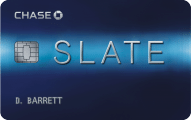 Chase Slate offers zero fees on balance transfers, no annual fees and low introductory APR’s (12.99%). Users also have a 15-month period for paying the balance. You’ll need a great credit score to apply for this card.
Chase Slate offers zero fees on balance transfers, no annual fees and low introductory APR’s (12.99%). Users also have a 15-month period for paying the balance. You’ll need a great credit score to apply for this card.
2. BankAmericard® Credit Card
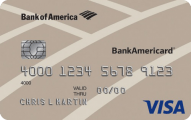 A smart choice for paying off hefty debt, this card offers a low regular interest rate and an 18-month return period. The balance transfer fee is $10 or 3%. On the other hand, it has no rewards and no purchase APR.
A smart choice for paying off hefty debt, this card offers a low regular interest rate and an 18-month return period. The balance transfer fee is $10 or 3%. On the other hand, it has no rewards and no purchase APR.
3. Discover it®
 Users of this card enjoy a high-value membership package. It provides great bonuses, an 18-month period for payment, 0% on purchases, and 0% on balance transfers for the enrollment time. Another feature is 5% cash back on spending up to $1,500.
Users of this card enjoy a high-value membership package. It provides great bonuses, an 18-month period for payment, 0% on purchases, and 0% on balance transfers for the enrollment time. Another feature is 5% cash back on spending up to $1,500.
Low Interest Credit Cards
1. Chase Freedom Unlimited℠
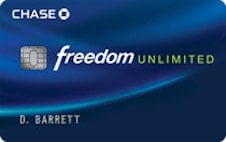 A flat 1.5% rewards rate is the first thing that pops out in the description of this card, a great rate that comes without annual fees. This card is in the Ultimate Rewards group, which means it can be paired with many other cards and increase the discounts or points value significantly. It is a great tool for savvy traveler, especially when paired with Chase Sapphire Preferred®.
A flat 1.5% rewards rate is the first thing that pops out in the description of this card, a great rate that comes without annual fees. This card is in the Ultimate Rewards group, which means it can be paired with many other cards and increase the discounts or points value significantly. It is a great tool for savvy traveler, especially when paired with Chase Sapphire Preferred®.
2. Capital One VentureOne
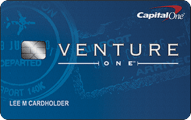 This card has a high APR and no introductory balance transfer APR, but it does have a sign-up bonus (when you spend $1,000 in three months). The VentureOne also has no foreign transaction fees, but it's not the best if you’re looking for travel points & rewards. When you miss a payment, you won’t have an unexpected late-payment fee, which is great.
This card has a high APR and no introductory balance transfer APR, but it does have a sign-up bonus (when you spend $1,000 in three months). The VentureOne also has no foreign transaction fees, but it's not the best if you’re looking for travel points & rewards. When you miss a payment, you won’t have an unexpected late-payment fee, which is great.
3. Citi® Diamond Preferred® Card
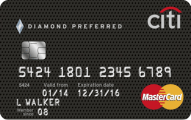 The Diamond Preferred's 21-month APR is certainly an attention grabber. It also has zero percent introductory APR, as well as low transfer and transaction fees. There are no rewards though, and the regular APR is quite high (12.24 -22.24%).
The Diamond Preferred's 21-month APR is certainly an attention grabber. It also has zero percent introductory APR, as well as low transfer and transaction fees. There are no rewards though, and the regular APR is quite high (12.24 -22.24%).
Credit Cards With Rewards Programs
Cash Back Credit Cards
1. Citi® Double Cash Card
 Double cash back opportunity is the main feature of the Citi® Double Cash Card. One percent of cash back on purchases, and one percent on payments on time, all without restrictions. If you’re looking for a cash back card, this deal is tough to beat. 15 months of 0% introductory APR, no annual fees, no enrollments.
Double cash back opportunity is the main feature of the Citi® Double Cash Card. One percent of cash back on purchases, and one percent on payments on time, all without restrictions. If you’re looking for a cash back card, this deal is tough to beat. 15 months of 0% introductory APR, no annual fees, no enrollments.
2. BankAmericard Cash Rewards™ Credit Card
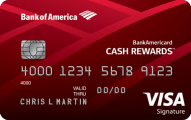 A hefty signup bonus is the first thing that will get your attention. It also offers 3% of cash back on the first $1,500 in combined gas and grocery purchases each quarter. There is an additional 1% cash back on purchases after reaching the $1,500 mark.
A hefty signup bonus is the first thing that will get your attention. It also offers 3% of cash back on the first $1,500 in combined gas and grocery purchases each quarter. There is an additional 1% cash back on purchases after reaching the $1,500 mark.
3. Blue Cash Preferred® Card from American Express
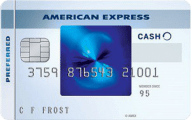 You want some noticeable cash back? Here’s a card that will provide it — 6% cash back at US supermarkets, 3% cash back at US gas stations and selected department stores, and 1% cash back on general purchases can add up to a significant sum. There is an annual fee of $75, but it is well worth it.
You want some noticeable cash back? Here’s a card that will provide it — 6% cash back at US supermarkets, 3% cash back at US gas stations and selected department stores, and 1% cash back on general purchases can add up to a significant sum. There is an annual fee of $75, but it is well worth it.
General Reward Points Credit Cards
1. Chase Sapphire Preferred®
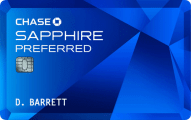 Choose this card if you enjoy dining out and traveling. For the first two categories you get 2X the points, and 1 point for everything else. There's a huge bonus for signing up in the first period (worth $625 of travel), huge flexibility and compatibility with other cards from Chase. There is no annual fee during the first year, but you need to pay $95 annually in the succeeding years.
Choose this card if you enjoy dining out and traveling. For the first two categories you get 2X the points, and 1 point for everything else. There's a huge bonus for signing up in the first period (worth $625 of travel), huge flexibility and compatibility with other cards from Chase. There is no annual fee during the first year, but you need to pay $95 annually in the succeeding years.
2. Blue Cash Preferred® Card from American Express
 The rewards offered by this card vary depending on the things you buy — 6% cash back at supermarkets, 3% at gas stations, and 1% on other purchases. The signup bonus is worth $150 and you need to spend $1,000 in the first three months. The big 6% bonus is limited to $6,000 worth of purchases, and bonuses are limited to the US territory. It has an annual fee of $75.
The rewards offered by this card vary depending on the things you buy — 6% cash back at supermarkets, 3% at gas stations, and 1% on other purchases. The signup bonus is worth $150 and you need to spend $1,000 in the first three months. The big 6% bonus is limited to $6,000 worth of purchases, and bonuses are limited to the US territory. It has an annual fee of $75.
3. Chase Freedom®
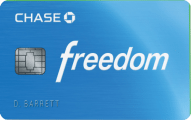 Chase Freedom card holders experience rotating cash back categories in every quarter and a high percentage of returns. It is compatible with other Chase cards and services, has a good signup bonus ($150 cash back on your first $500 purchases in the first three months), and 15 months of 0% APR. It has no annual fees.
Chase Freedom card holders experience rotating cash back categories in every quarter and a high percentage of returns. It is compatible with other Chase cards and services, has a good signup bonus ($150 cash back on your first $500 purchases in the first three months), and 15 months of 0% APR. It has no annual fees.
Travel Points Credit Cards
1. Capital One® Venture® Rewards Credit Card
 Flexible, high-rewarding, and multi-functional, the Capital One® Venture® Rewards Credit Card offers two points on every dollar spent. The hefty bonus that you can reach equals $400 in value. Points can be exchanged for travel rewards.
Flexible, high-rewarding, and multi-functional, the Capital One® Venture® Rewards Credit Card offers two points on every dollar spent. The hefty bonus that you can reach equals $400 in value. Points can be exchanged for travel rewards.
Not being able to transfer points is the single downside, which isn’t significant.
2. Barclaycard Arrival Plus™ World Elite MasterCard®
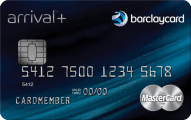 The travel benefits program of this card is exquisite. 2.1% cash back on all spending while traveling, with an amazing amount of bonus miles (up to 40,000) after spending more than $3,000 in the first three months. No transaction fees on anything bought abroad.
The travel benefits program of this card is exquisite. 2.1% cash back on all spending while traveling, with an amazing amount of bonus miles (up to 40,000) after spending more than $3,000 in the first three months. No transaction fees on anything bought abroad.
3. The Starwood Preferred Guest® Credit Card from American Express
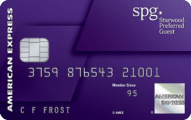 Among dozens of cards with travel rewards, the Starwood Preferred Guest Credit Card from A.E. is set apart by a very high dollar value per point and a very generous rewards programs. If you spend a lot of time in hotels, this one is perfect for you. The only con worth mentioning is that the benefits favor pricey hotels.
Among dozens of cards with travel rewards, the Starwood Preferred Guest Credit Card from A.E. is set apart by a very high dollar value per point and a very generous rewards programs. If you spend a lot of time in hotels, this one is perfect for you. The only con worth mentioning is that the benefits favor pricey hotels.
Retail Rewards Credit Cards
1. BuyPower Card from Capital One®
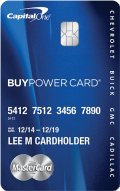 If you are thinking about purchasing a new Chevrolet, Cadillac or a Buick, this is the best option for you. You will get 5% earning on your first $5,000 worth of purchases, and after that, you’ll have unlimited 2%. One of the most important features of this card is that there are no annual or foreign transaction fees. If you want to increase your savings, you can combine earnings with the GM offers and incentives.
If you are thinking about purchasing a new Chevrolet, Cadillac or a Buick, this is the best option for you. You will get 5% earning on your first $5,000 worth of purchases, and after that, you’ll have unlimited 2%. One of the most important features of this card is that there are no annual or foreign transaction fees. If you want to increase your savings, you can combine earnings with the GM offers and incentives.
2. PlayStation® Card from Capital One®
 Play Station and Sony lovers will surely enjoy this card. You will get 10 points for 1$ spent on all PlayStation® Store purchases and many others rewards while shopping in these stores. The APR on purchases before February 2017 is 0% and 14.24% – 24.99% afterwards. There is no annual fee.
Play Station and Sony lovers will surely enjoy this card. You will get 10 points for 1$ spent on all PlayStation® Store purchases and many others rewards while shopping in these stores. The APR on purchases before February 2017 is 0% and 14.24% – 24.99% afterwards. There is no annual fee.
3. The Plenti® Credit Card from Amex
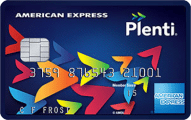 The Plenti credit card offers you 5,000 points after your first 3-month purchase if you spend $250. There is no annual fee for this card and for additional cards. You get 2 Plenti points at US supermarkets and 3 points for restaurants as well as other purchases.
The Plenti credit card offers you 5,000 points after your first 3-month purchase if you spend $250. There is no annual fee for this card and for additional cards. You get 2 Plenti points at US supermarkets and 3 points for restaurants as well as other purchases.
Gas Cards with Points or Rebates
1. Barclaycard Rewards MasterCard®
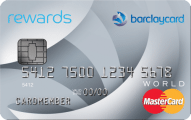 The Barclaycard Rewards MasterCard offers 2 points on gas and groceries. There is no sign-up bonus but it doesn’t charge an annual fee.
The Barclaycard Rewards MasterCard offers 2 points on gas and groceries. There is no sign-up bonus but it doesn’t charge an annual fee.
2. Blue Cash Everyday®
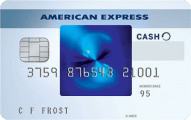 Another great reward card is the Blue Cash Everyday. It provides 3% cash back on groceries, and 2% cash back on gas. Premium benefits include free hotel rooms upgrade and rental car insurance. There is no annual fee.
Another great reward card is the Blue Cash Everyday. It provides 3% cash back on groceries, and 2% cash back on gas. Premium benefits include free hotel rooms upgrade and rental car insurance. There is no annual fee.
3. Capital One® Quicksilver®
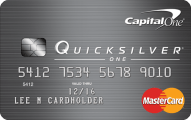 Quicksilver is the best card if you like simplicity. The card provides 1.5 percent cash back on every purchase you make, such as gas, groceries, and utilities.
Quicksilver is the best card if you like simplicity. The card provides 1.5 percent cash back on every purchase you make, such as gas, groceries, and utilities.
The excellent thing about this card is that no annual fee is needed.
Frequent Flyer Credit Cards
Airline-Specific Credit Cards
1.The JetBlue Card
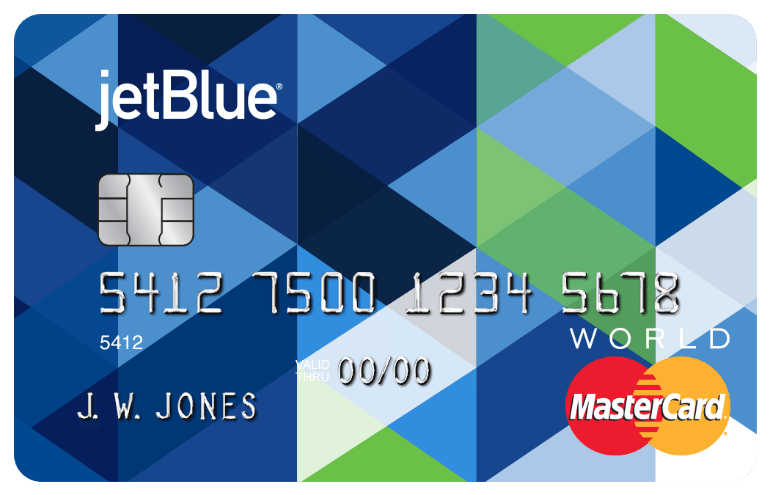 Although it is new on the market, this card is quite popular because of its excellent award system. You can earn up to 3x points when you buy with JetBlue and 2x points for every dollar spent in grocery stores and restaurants. It has no annual fee.
Although it is new on the market, this card is quite popular because of its excellent award system. You can earn up to 3x points when you buy with JetBlue and 2x points for every dollar spent in grocery stores and restaurants. It has no annual fee.
2. The Gold Delta SkyMiles®
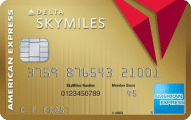 With this card, you can get 30,000 bonus miles for $1,000 worth of purchases within this first 3 month. This card also has the potential for consistent reward earnings. This card has a zero introductory annual fee for the first year, after that the annual fee is $95.
With this card, you can get 30,000 bonus miles for $1,000 worth of purchases within this first 3 month. This card also has the potential for consistent reward earnings. This card has a zero introductory annual fee for the first year, after that the annual fee is $95.
3. British Airways Visa Signature® Card
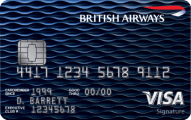 This card offers 50,000 bonus Avios points if you make a purchase that has a value of $2,000 or more in the first 3 months. You also get 25,000 Avios points if you make $15,000 worth of purchases within your first year —that’s 75,000 Avios points in total. If you charge $30,000 worth of purchases within every calendar year, you get a “Travel together” ticket that is viable for 2 years.
This card offers 50,000 bonus Avios points if you make a purchase that has a value of $2,000 or more in the first 3 months. You also get 25,000 Avios points if you make $15,000 worth of purchases within your first year —that’s 75,000 Avios points in total. If you charge $30,000 worth of purchases within every calendar year, you get a “Travel together” ticket that is viable for 2 years.
Generic Airline Miles Cards
1. BankAmericard Travel Rewards Credit card
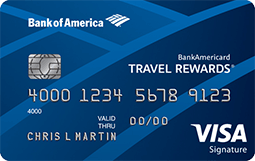 With this credit card you can get unlimited 1.5 points for every dollar spent on all kinds of purchases. This cards also has no annual fee and has no foreign transaction fees. You can redeem this points for statement credits which can pay for flights, vacation packages and other travel expenses.
With this credit card you can get unlimited 1.5 points for every dollar spent on all kinds of purchases. This cards also has no annual fee and has no foreign transaction fees. You can redeem this points for statement credits which can pay for flights, vacation packages and other travel expenses.
2. Barclaycard Arrival™ World MasterCard®
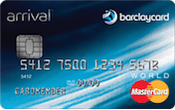 This credit card has a good program for those who like to travel and dine out a lot. You can earn 20,000 bonus miles after you spend $1,000 in the first 90 days — that alone is enough to redeem a $200 statement credit for travel. Although this card is fantastic for travel, its balance transfer fees are not that good.
This credit card has a good program for those who like to travel and dine out a lot. You can earn 20,000 bonus miles after you spend $1,000 in the first 90 days — that alone is enough to redeem a $200 statement credit for travel. Although this card is fantastic for travel, its balance transfer fees are not that good.
3. Capital One® Venture® Rewards Credit Card
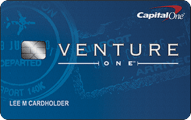 Capital One® Venture® Rewards Credit Card has the best miles-to-purchase ratio and perks. With this card, you can get $400 equal in travel if you spend $3,000 on purchases within 3 months — that is 40,000 bonus miles. You can earn 2x miles for every dollar spent. This card applies to any airline or hotel, which makes this credit card great for frequent travelers. There is no annual fee for the first year, but succeeding years will have an annual fee of $59.
Capital One® Venture® Rewards Credit Card has the best miles-to-purchase ratio and perks. With this card, you can get $400 equal in travel if you spend $3,000 on purchases within 3 months — that is 40,000 bonus miles. You can earn 2x miles for every dollar spent. This card applies to any airline or hotel, which makes this credit card great for frequent travelers. There is no annual fee for the first year, but succeeding years will have an annual fee of $59.
Bad Credit and/or Credit Repair Cards
Secured Credit Cards
1. Capital One® Secured MasterCard®
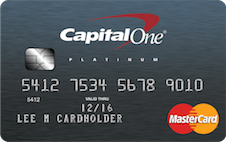 With Capital One® Secured MasterCard®, after a minimum deposit, you get a $200 credit line. There are no annual fees and no foreign transaction fees, making it the perfect travel companion. On the other hand, you need to fulfill strict requirement to be eligible for this card.
With Capital One® Secured MasterCard®, after a minimum deposit, you get a $200 credit line. There are no annual fees and no foreign transaction fees, making it the perfect travel companion. On the other hand, you need to fulfill strict requirement to be eligible for this card.
2. OpenSky® Secured Visa® Credit Card
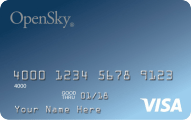 This card has an affordable annual fee of $35 and offers reputable connections to credit bureaus. Along with the quick and easy signup, you also get multiple options for money transfer without a traditional bank account.
This card has an affordable annual fee of $35 and offers reputable connections to credit bureaus. Along with the quick and easy signup, you also get multiple options for money transfer without a traditional bank account.
3. primor® Secured Visa Gold Card
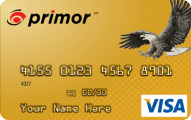 With a low income requirement (your income just needs to exceed your expenses by $100) and a fast application processing, this card is an excellent choice for credit repair. The 9.99% APR is fixed and it has an annual fee of $49. Credit bureaus are constantly updated with activity from the card.
With a low income requirement (your income just needs to exceed your expenses by $100) and a fast application processing, this card is an excellent choice for credit repair. The 9.99% APR is fixed and it has an annual fee of $49. Credit bureaus are constantly updated with activity from the card.
Prepaid Credit Cards
1. Kaiku Visa® Prepaid Card
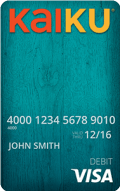 No fees – this is the first and most noticeable fact that Kaiku Visa Prepaid Card offers to customers. The maintenance fee is $3 per month, and it can be waived if you deposit $750 or more a month. If you use credit cards for small purchases during the month, this one is an excellent choice.
No fees – this is the first and most noticeable fact that Kaiku Visa Prepaid Card offers to customers. The maintenance fee is $3 per month, and it can be waived if you deposit $750 or more a month. If you use credit cards for small purchases during the month, this one is an excellent choice.
2. American Express Serve
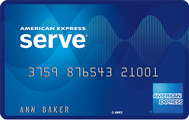 Low fees, free usage of wide-spread MoneyPass network, and one dollar for monthly maintenance are reasons enough to consider this credit card. It also has the globally-recognized American Express reliability and security. This card is also compatible with mobile banking.
Low fees, free usage of wide-spread MoneyPass network, and one dollar for monthly maintenance are reasons enough to consider this credit card. It also has the globally-recognized American Express reliability and security. This card is also compatible with mobile banking.
3. NetSpend® Visa® Prepaid Card
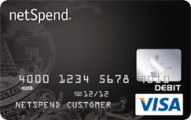 The NetSpend card is accepted everywhere and offers 100% approval. Paychecks arrive two days earlier, and there are no hidden fees. Your funds are insured by the FDIC – Federal Deposit Insurance Corporation, but you need to register with your ID. There is a $300 daily withdrawal limit.
The NetSpend card is accepted everywhere and offers 100% approval. Paychecks arrive two days earlier, and there are no hidden fees. Your funds are insured by the FDIC – Federal Deposit Insurance Corporation, but you need to register with your ID. There is a $300 daily withdrawal limit.
Specialty credit cards
Student Credit Cards
1. Discover it® for Students
 This student card is easy to obtain, allows for a co-signer, and provides opportunities for responsible spending. There are no annual fees, no over-the-limit fee, and six months of 0% APR, which becomes 13.24% to 22.24% later on. To gain maximum use from this card, you need to spend in the card’s rotating categories.
This student card is easy to obtain, allows for a co-signer, and provides opportunities for responsible spending. There are no annual fees, no over-the-limit fee, and six months of 0% APR, which becomes 13.24% to 22.24% later on. To gain maximum use from this card, you need to spend in the card’s rotating categories.
2. Journey® Student Rewards from Capital One®
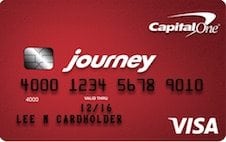 This is the card especially designed for students. It provides 1% on every purchase, and 1.25% cash back for paying on time. Some might consider the rewards small, but if you’re a responsible in paying, you won’t find a better offer today.
This is the card especially designed for students. It provides 1% on every purchase, and 1.25% cash back for paying on time. Some might consider the rewards small, but if you’re a responsible in paying, you won’t find a better offer today.
3. Citi ThankYou® Preferred Card for College Students
 Citi provides one of the best credit cards for students, attracting new customers with a great signup reward (2,500 ThankYou® Points after spending $500 during the first 3 months), versatile and multi-functional points, and no annual fees. The downside of this card is in the cash back, as it is focused more on getting services for points.
Citi provides one of the best credit cards for students, attracting new customers with a great signup reward (2,500 ThankYou® Points after spending $500 during the first 3 months), versatile and multi-functional points, and no annual fees. The downside of this card is in the cash back, as it is focused more on getting services for points.
Apply HERE.
Business Credit Cards
1. Ink Cash® Business Credit Card
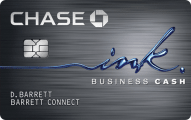 Chase provides a quality set of business cards for various corporate needs. Big cash back rewards (5% of the first $25,000 in multiple categories combined), plenty of 0% APR time, and good connection to the business credit bureaus are some of its attractive features.
Chase provides a quality set of business cards for various corporate needs. Big cash back rewards (5% of the first $25,000 in multiple categories combined), plenty of 0% APR time, and good connection to the business credit bureaus are some of its attractive features.
2. The Capital One® Spark® Cash for Business
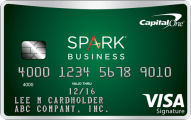 With this card, you’ll have 2% of cash back with no time expiration, and $500 in cash bonuses when you spend $45.00 within the signup bonus period (three months).
With this card, you’ll have 2% of cash back with no time expiration, and $500 in cash bonuses when you spend $45.00 within the signup bonus period (three months).
3. SimplyCash® Plus Business Card from American Express
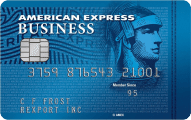 This card has a promotional period at the moment, providing a bonus signup reward ($250 for $5,000 and more spent).
This card has a promotional period at the moment, providing a bonus signup reward ($250 for $5,000 and more spent).
The reward system lets the user pick where to earn the 3% cash back, combined with several different categories so you can maximize your cash rewards.
Credit Card Safety
Credit cards have become a modern convenience, but most of us fail to realize that we carry a small fortune with us every day. Even though credit cards are relatively safe (compared to carrying cash), they come with their own set of security issues and holders are targeted by thieves and hackers. Here are some practical tips that will help you keep your money and identity safe when using plastic.
Your signature comes first – On the back of your credit card is a blank space for your signature. Be sure to sign your card as soon as possible. Your signature is a proof of identity if your card gets stolen.
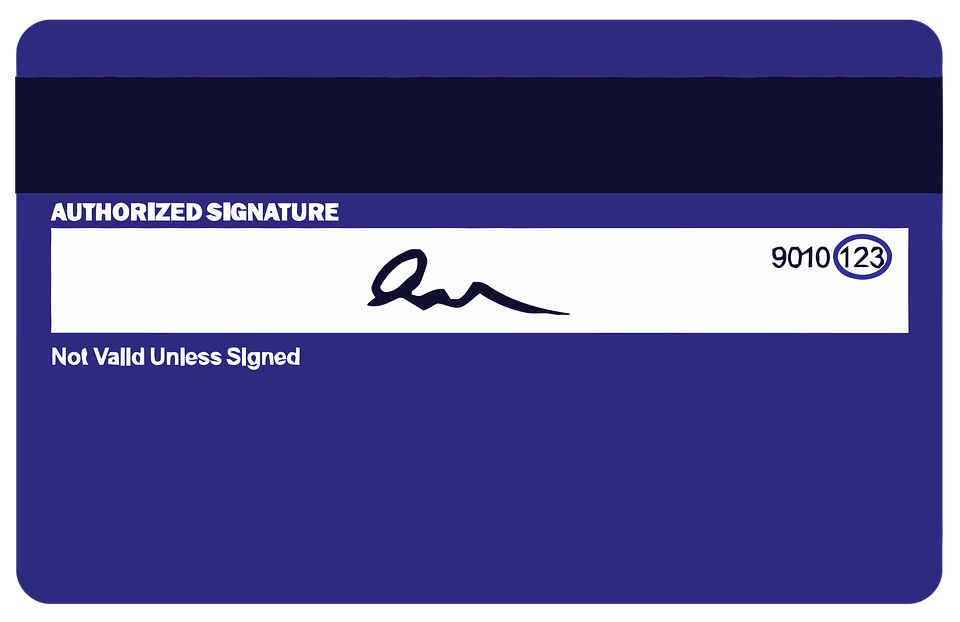
Actively monitor your account – You should have up-to-date knowledge about your balance and expenses. Some banks offer SMS notifications whenever a withdrawal or purchase is made using your account. Online banking is also a great way to keep track of your credit card activity.
Protect your PIN – Never share your PIN with anyone. Memorize this code and never keep your written PIN in the same place as your credit card.
Keep your account number confidential – Identity thieves can use this information to make unauthorized transactions using your account. Never display your card account number in public or post a picture of it online.
- Be careful about disclosing your account number over the phone. Share this information only if you are certain of the identity of the person you are speaking with.
- Remember that banks will never ask for your account number via e-mail.
- Use online banking whenever possible to bypass any potential mail theft.
Take care when accepting receipts – Receipts can be easily manipulated if you are not careful enough.
- Figures can be added to blank spaces so try to cross them out while signing the receipt.
- Do not throw away your receipts. Keep them as proof in case there are errors in your credit card statement.
Prepare for online banking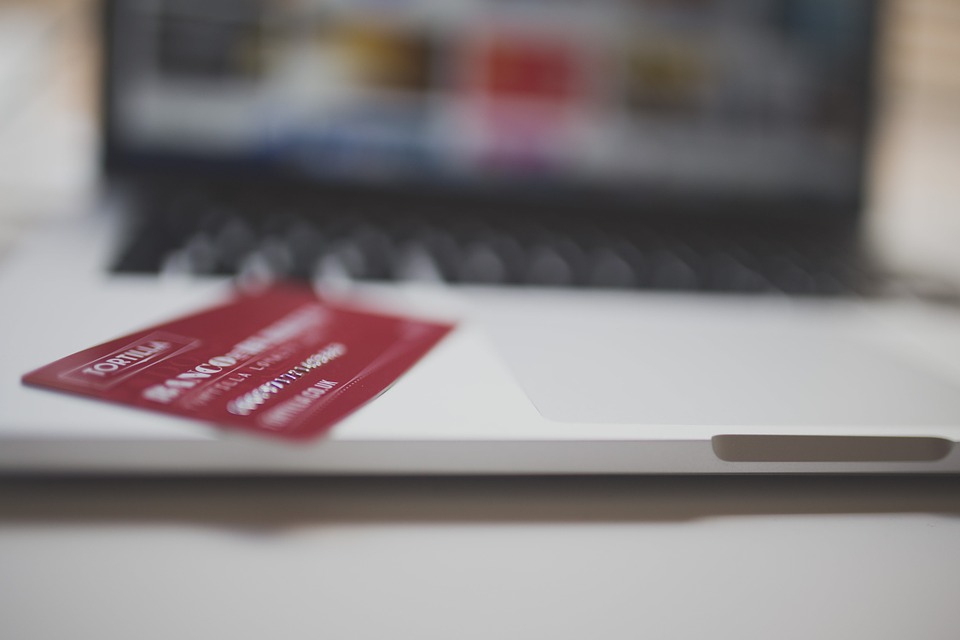
- Make sure that any device you use for online banking is secure. It's best to reserve online banking to devices that only you can access.
- Install firewalls and anti-virus programs on your device. This is a smart investment especially if your online transactions are business related.
- Make sure you have updated your browser as well as any app you might be using for online banking.
- Follow the standard rules about passwords for your online account. Do not use your name, your birthday or anything that can be guessed by a hacker. A strong password is case-sensitive and contains both letters and numbers. Don’t share your password with anyone and try to change it regularly.
- Use only apps and programs verified by your bank and your anti-virus software.
You can never be too careful with online shopping
- Shop only via the secure and well-known sites. Look through their terms and conditions, especially about the store's responsibility if something goes wrong with your transaction.
- Print a copy of transactions done online and store it with your receipts.
If something does happen, act swiftly – If you happen to misplace your credit card or if you notice any irregularity considering your account, contact your bank right away. As soon as you report a suspicious incident, your bank quickly freezes the account and gives you another one instead. Speed is of the essence; the price of a new card is worth it compared with the potential damage a thief could do.
I haven't reported my missing credit card to the police because whoever stole it is spending less than my wife. – Ilie Nastase, former no. 1 tennis player
Frequently Asked Questions
What information does a bank need to process a credit card application?
Since it involves borrowing money, applying for a credit card is similar to getting a bank loan. Credit card issuers will ask for the following personal information: full name, Social Security number, home address, birthday and estimated annual gross income.
Why is my personal information necessary when applying for a credit card?
All banks operating in the USA are required by Federal Law to obtain your personal information in order to confirm the identity of the person opening the account.
Can multiple individuals apply for one credit card account?
No. A credit card is issued to only one person, but the owner can subsequently authorize other users. Most banks allow one credit card to be used by several persons, although the credit limit remains the same.
What is a credit limit?
The credit limit is the maximum amount you can borrow using a credit card.
What happens if I go over my credit limit?
Some banks allow you to go over the credit limit, but they will charge additional fees when this happens. Other banks will simply reject additional transactions when your credit limit is reached.
What is a cash credit limit?
A cash credit limit is the amount of your credit card balance that is available for cash transactions. This mostly consists of ATM cash transactions, over-the-counter cash usage, cash advances, and similar transactions.
How much should I pay each month?
The amount should be clearly visible in the credit card statement under the total payment section. However, you can choose to pay the minimum payment if you have agreed to such terms with your bank.
How do I receive my credit card statement?
Usually, your credit card statement will be mailed to you monthly on the exact date set between you and your bank.
How can I check my current credit card balance?
The easiest way is to login via online banking if your bank supports this system. There should also be a hotline number that you can call to inquire about your account balance. Going personally to the bank is also an option. Be cautious and check your account activity often. This helps you spot errors or suspicious transactions quickly.
Is there a way to increase the credit card limit?
Most banks will be happy to increase your credit limit if you meet the necessary conditions. Besides the credit calculation system that banks use, you would also need to be a credit card holder for a significant amount of time.
What is the best way to make my credit card payments?
Internet and mobile banking are secure options for credit card payments. Schedule automatic payments to avoid missing deadlines and paying late penalties.
What factor affects my interest charge the most?
Interest charges vary significantly from bank to bank, with numerous factors used for the final calculation. Credit cards function like loans and the interest charge can vary from month to month. When applying for a credit card, you should look into the interest rate and what determines their fluctuations. Factors that always affect the interest charge are purchases (especially if you don't have a grace period) late payments, and not paying in full.
What should I do if I see an error in my credit card statement?
Be sure to report any error in your credit card statement immediately. There should be a call-center registered within your bank or you can send an email about it. The best option is to personally go to the bank, as it is the safest way to handle transactions that require your account information.
Can credit cards be used internationally?
Some companies offer this option, but always notify your bank if you plan on traveling abroad. Some banks charge additional fees when a credit card is used in another country. They will also verify if you are indeed out of the country to prevent identity theft. Using an ATM machine overseas is possible, but keep in mind that not all ATM machines display English instructions. If your card doesn’t have a travel option, you can buy a prepaid travel card which acts as a debit card that can be used internationally.
What happens if I am unable to make credit card payments?
Failure to pay your credit card balance on time can lead to serious consequences. If you are unable to give the minimum payment, the bank can charge additional fees and higher interest rates. If you miss more payments, the bank can and will use other accounts you might have in that bank to make up for the lost money. Your FICO score will be affected and the credit card issuer can start legal actions against you.
Conclusion
Credit cards have changed the way we handle financial transactions. This Ultimate Credit Card Guide helps you maximize the powers of plastic. Handled responsibly, credit cards can help sustain a frugal lifestyle.



